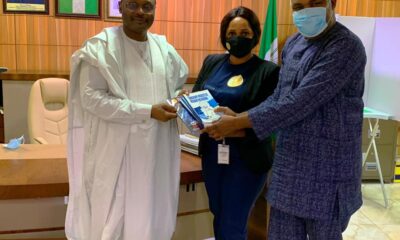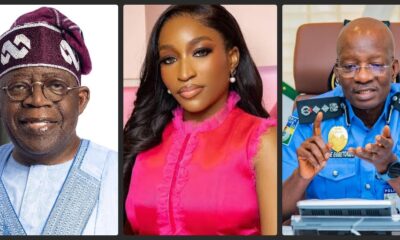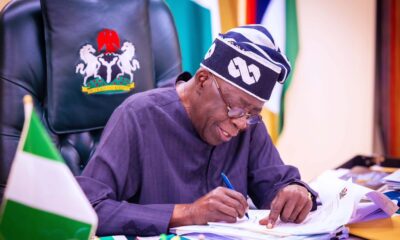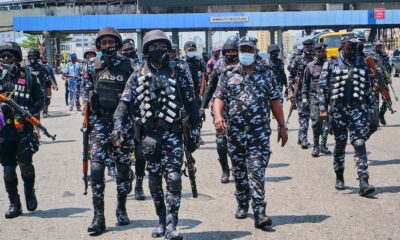Opinion
Marriage: Navigating Rejection and Its Impact

By Stacey Ukaobasi O
Marriage is a union between two individuals, but it often involves integrating into each other’s families. Acceptance from both families can significantly influence the dynamics of the relationship. In many cases, acceptance or rejection from the in-laws can play a pivotal role in determining the fate of the marriage.
Thomas Aquinas is one of the most respected theologians of the Roman Catholic Church, who introduced a profound body of knowledge on the concept and theology of marriage. We will borrow a little from his thoughts before we proceed with our thematic discussion on the dynamics of marriage.
The Permanence of Marriage
Indissoluble by Nature:
Saint Thomas: By the intention of nature, marriage is directed to the rearing of the offspring, not merely for a time, but throughout its whole life. Hence it is of natural law that parents should lay up for their children, and that children should be their parents’ heirs (2 Corinthians 12:14). Therefore, since the offspring is the common good of husband and wife, the dictate of the natural law requires the latter to live together forever inseparably: and so the indissolubility of marriage is of natural law. (Supplement Q. 67 A. 1)
Commentary: Marriage is founded on the primary end of marriage, whence comes a naturally inseparable union. Such permanence brings about the happy result of a stable family.
A Further Aid to the Primary End of Marriage:
Saint Thomas: Now a child cannot be brought up and instructed unless it have certain and definite parents, and this would not be the case unless there were a tie between the man and a definite woman, and it is in this that matrimony consists. (Supplement, Q 41. A1).
However, despite this theological background of marriage, there are several social factors that could necessitate peaceful dissolution, which we will try to encapsulate going forward.
Acceptance and Rejection: The Two Determining Factors
In marriage, acceptance and rejection are two powerful forces that can shape the course of the relationship. Acceptance fosters a sense of belonging, love, and support, while rejection can lead to feelings of isolation, stress, and anxiety. There are two primary types of rejection that couples may face: underground rejection and open rejection.
Underground rejection is subtle and often expressed behind closed doors. Family members may not openly express their disapproval, but their actions and body language can convey their feelings. Open rejection, on the other hand, is direct and explicit. It can manifest as confrontational behavior or outright disapproval from in-laws.
When a spouse feels rejected by their partner’s family, it can create significant stress and tension in the marriage. The couple may feel like they’re walking on eggshells, constantly trying to prove themselves to their in-laws. This can lead to feelings of resentment and frustration, potentially straining the relationship.
The impact of rejection can go as far as the couple feeling reluctant in attending family gatherings because they know there’s no genuine love. This can lead to feelings of isolation and disconnection from the family.
In some cases, having a male child may lead to increased acceptance or tolerance from the in-laws, even if they initially didn’t approve of the wife. However, having female children may exacerbate the situation, leading to more tension and stress in the marriage. This dynamic is often more prevalent among illiterate in-laws, who may hold traditional views and expectations. In some instances, these in-laws may persist in their disapproval, making the woman’s life a living hell regardless of the length of the marriage. The impact of these expectations can vary depending on individual circumstances and the specific family dynamics.
LET’S LEAVE THIS TOPIC FOR ANOTHER DAY!
Now let’s consider the story of a single mother from Enugu Ukwu who relocated to Canada with her two kids. From the outset, her future father-in-law expressed his reservations about her past, asking her how she would feel if her brother wanted to marry a woman with two kids. He further told her that he heard she was a prostitute, which was demeaning and hurtful. Despite this open rejection, she chose to stay and work hard to prove him wrong. Eventually, she married her partner, but the acceptance she received seemed to be conditional, based on the birth of her grandchildren. The absence of her partner’s siblings at their wedding, despite their proximity, further emphasized the lack of acceptance from the broader family unit.
There’s also the story of a man I know very well who traveled abroad and later returned home to marry his longtime sweetheart. Despite his parents’ disapproval, he went ahead with the marriage, and they didn’t attend the wedding. The outcome of their relationship remains uncertain, but it highlights the challenges couples may face when their families don’t approve of their partner.
When a spouse feels rejected or unaccepted by their partner’s family, it can have long-term implications for the marriage. The couple may feel like they’re living on eggshells, constantly trying to navigate the complex web of family dynamics. This can lead to feelings of resentment, frustration, and burnout.
- Acceptance is key. Recognize that your child or sibling has chosen this person for a reason, and they deserve respect and kindness.
- Love and respect go a long way: Treat your new family member with the same love and respect you’d want for yourself or your own family.
- Don’t judge: Avoid making assumptions or judgments about someone based on limited information. Get to know them as an individual.
- Support your loved one. Be there for your loved one and support their decision, even if you don’t fully understand their choice.
By following these principles, you can help create a more positive and loving atmosphere in your family. Acceptance and love are essential for building strong, resilient relationships that benefit both the couple and their children. But also, my dear African women. In challenging situations, prioritizing your well-being and that of your children is crucial. If a relationship becomes overly stressful or toxic, and your partner isn’t supportive, it may be necessary to reassess the situation.
Your mental health and the safety of your children should be top priorities. If the situation doesn’t improve, considering a separation or divorce might be the best decision, regardless of previous marriages, attempts, or even if you have 20 male children for the man. Ultimately, walking away can be a brave and necessary step to protect yourself and your children.
Peace of mind and a stress-free life, especially for the sake of children, is crucial and in conclusion, surrounding yourself with genuine love and acceptance can significantly impact your overall well-being and happiness. It’s essential to recognize when a situation is no longer serving one’s best interests and to take steps to create a more positive and nurturing environment.
Stacey Ukaobasi is the founder of the FORUM FOR CHILD RIGHTS PROMOTION, Nigeria, a Non-Governmental Organisation.
Opinion
MAHMOOD: A Humane Assessment
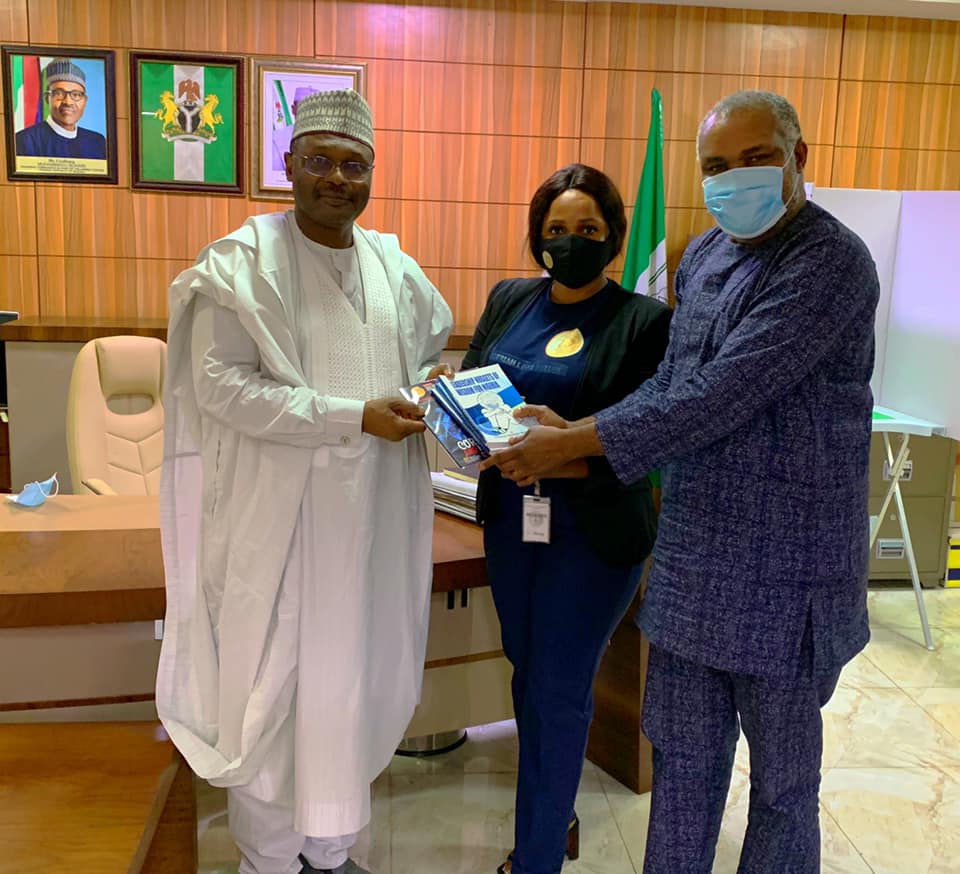
By: Emmanuel Nnadozie Onwubiko
“Be a good human being, a warm-hearted, affectionate person. That is my fundamental belief.”
(-14th Dalai Lama)
“If you judge people, you have no time to love them.”
(-Mother Teresa)
Professor Mahmood Yakubu leaves the Independent National Electoral Commission after ten years at its helm; a decade that will be debated, dissected and, I suspect, ultimately judged kindly by history. President Bola Ahmed Tinubu has formally accepted Professor Yakubu’s departure and, in recognition of his service, conferred on him the national honour of Commander of the Order of the Niger. The handover to the most senior national commissioner, May Agbamuche-Mbu, marks the end of an era and the start of another fraught moment for Nigeria’s electoral architecture.
To assess Yakubu fairly, we must do two things at once: catalogue the hard, demonstrable changes he put in place to modernize Nigeria’s elections, and then judge how those changes held up under the stress test of Nigeria’s deeply adversarial politics. On the first task (the one that will determine whether INEC is stronger on the morning after his exit than it was on the morning of his appointment), Yakubu’s record is substantial, concrete and, in many ways, transformative.
When Mahmood Yakubu arrived at INEC in November 2015, he inherited an electoral agency that had begun to recover public trust after the Attahiru Jega years. Over the next decade, he pursued a program of institutionalising technology, stabilizing processes and expanding access to the register; reforms that were not merely cosmetic but structural. The Bimodal Voter Accreditation System (BVAS) became a fixture at polling units; the machine records accredited voters, stores a picture of the EC8A (the polling unit result sheet) and was designed to reduce the kind of human tampering that has long hollowed out confidence in electoral outcomes. Complementing BVAS was the INEC Result Viewing portal (IReV); a public interface that allowed citizens, parties and observers to compare what was uploaded from polling units with what was being collated at state and national centres. Those two innovations (the biometric accreditation and the result-viewing portal), are not mere gadgets. They rewired the spine of the results chain and moved Nigeria from paper-only opacity toward a model of verifiable transmission.
Technology alone does not make an election free or credible; it makes verification possible. Yakubu’s INEC institutionalised procedures that, for the first time in decades, made it relatively easy for political actors and citizens to detect discrepancies between the result sheets at polling units and what appeared on official portals. This had a practical consequence: in the 2023 general elections, several outcomes that would once have been unthinkable were validated on the ground and in the collation halls. The fact that results ran against the presumed preferences of political heavyweights (from presidential candidates to incumbent governors) is itself evidence that the mechanics of counting and transmission were functioning in ways that allowed voters’ choices to surface. Consider three state-level examples that mattered politically and symbolically.
In Lagos (the commercial hub that was, for decades, a political fief of Bola Tinubu), the Labour Party’s Peter Obi won the plurality of votes, a seismic outcome that spoke to the emergence of new urban coalitions and, importantly, to the ability of INEC’s systems to capture and publish polling unit returns for citizens and the media to scrutinise. That result, confirmed in the data and widely reported by credible international outlets, undercut the narrative that the commission could be bent to produce a foregone conclusion in even the most politically sensitive geographies.
In Osun State, the presidential tally favoured the Peoples Democratic Party’s candidate, an outcome that again cut across expectations and local party machines. And in the Federal Capital Territory, Abuja, the Labour Party’s dominance was decisive and visible on the result portals and official collations. These were not trivial or isolated quirks; they were systemic signs that votes were being counted and reported in ways that allowed the people’s will to be revealed, even when that will clashed with established power.
If one wishes to measure institutional independence by outcomes, look also to the rout of political heavyweights who assumed their influence could buy them seats. At least five outgoing governors who sought to move to the Senate after two terms were defeated by opponents; an outcome that would have been harder to engineer if the electoral market were rigged in favour of incumbency rent. The International Centre for Investigative Reporting recorded the defeats of prominent outgoing governors — Samuel Ortom (Benue), Ifeanyi Ugwuanyi (Enugu), Darius Ishaku (Taraba), Simon Lalong (Plateau) and Ben Ayade (Cross River) — and their losses were widely reported as evidence that the electorate and the electoral machinery combined to produce genuine upsets.
The list of losers includes not only governors but a string of sitting national assembly leaders and committee chairmen who were unseated; a political cleansing of sorts that reflected voters’ impatience and the capacity of the electoral process to enforce it. ICIR’s compilation of National Assembly members who lost their seats in 2023 reads like a catalogue of the vulnerable and the over-confident: minority leaders, long-standing committee chairs and seemingly secure incumbents found themselves out of office when results were tallied and verified. Those outcomes matter because they are measurable, verifiable instances where the electoral process functioned against the grain of personal power.
Bauchi State (Professor Yakubu’s birth state) offers another telling case. In 2023, the presidential vote there swung to the Peoples Democratic Party, handing the opposition a clear victory in the INEC chairman’s own homestead and reinforcing the larger pattern: the mechanics of counting, accreditation and result viewing allowed an opposition triumph in a competitive state where the ruling party expected to be strong. That is a powerful vindication for any electoral manager who sought above all to let the ballot do its work.
Beyond technology and headline-defying results, Yakubu worked to professionalise INEC’s back offices: improving voter registration logistics, expanding the Continuous Voter Registration portal, strengthening training for ad hoc staff and pushing for greater transparency in party primaries. He presided over the creation or consolidation of units within INEC aimed at research, legal affairs and election operations management; slow, bureaucratic work that rarely makes front pages but is essential if an electoral commission is to endure beyond electoral cycles. The Electoral Institute, an INEC initiative, and the commission’s investment in training and data management are part of that quieter, but critical, reform legacy.
All of this, however, must be tempered by honesty. A reformer’s legacy is not simply measured in new machines and portals, but in how the institution responds when things go wrong. The 2023 general election was not flawless. There were well-documented technical glitches with result transmission during the presidential contest; there were delays and disruptions in some states that opened space for suspicion; turnout was depressingly low relative to the number of registered voters, and communication from the commission to the public was sometimes clumsy. Critics (both domestic and international) documented lapses in planning and execution that frustrated expectations that the new technology would magically solve decades of logistical and political problems. Those criticisms are partly fair and partly the byproduct of unrealistic expectations, but they matter all the same.
Nevertheless, when the ledger is balanced, one must concede that Yakubu’s stewardship materially strengthened the capacity of the commission to record, transmit and publish election results. The simple truth is that over his two terms, Nigeria saw the operational roll-out of innovations (BVAS and IReV among them), that converted what had been an opaque counting process into one that could be audited, interrogated and, often, verified by citizens and independent monitors. Where previously suspicion flourished because of lack of transparency, the new systems reduced opportunities for stealthy manipulation; though they did not eliminate them. The point is crucial: independence and procedural integrity were not magically guaranteed by technology, but technology made accountability possible in ways that were previously unimaginable.
The political context in which Yakubu worked should not be ignored. For eight years under President Muhammadu Buhari, public commitments and INEC’s own pronouncements suggested a relative absence of direct presidential interference in the commission’s operating space. Both the executive’s pledges and the facts of contested results that went against incumbent power contributed to an environment in which INEC could, more often than not, execute its mandate without executive fiat. Buhari’s public promise to respect INEC’s independence and the commission’s repeated insistence that it was not under external influence are on the record.
But that is now the past. The present and the future are different. As the transition occurs under President Bola Tinubu, there are deep and widely expressed concerns in the civic and international communities about the stakes of the INEC leadership appointment ahead of the 2027 general elections. International IDEA, CDD-West Africa and other analysts have warned that the appointment to lead INEC in the run-up to another general election is among the highest political stakes a president can face; and that politicising the commission’s leadership risks eroding the very gains Yakubu helped secure. Those warnings are not partisan insinuations; they are sober analyses from electoral experts about institutional risk at moments of transition.
Let me be plain. The verdict that must guide public judgment is this: Professor Mahmood Yakubu performed very well, humanly speaking. He was not infallible; no administrator operating in Nigeria’s febrile politics could be. He made choices, some of which produced predictable controversy. But on balance, he steered INEC toward modern systems, increased transparency, and a greater capacity to resist straightforward manipulation. The evidence is before us in the technical architecture he left behind and the election outcomes that proved, time and again, that votes could surprise the powerful. Those are not idle boastings; they are measurable improvements in how we count and report votes.
If Yakubu deserves praise, he also deserves constructive criticism. Technology is only as good as the contingency plans that sustain it. The commission must, in future, invest far more in redundancy, offline reconciliation protocols and independent audits of the transmission chain. Result-viewing portals must be backed by resilient data centres and clear, rapid public communication when outages occur; IReV’s temporary failures in 2023 became political fodder precisely because the commission had not explained contingencies early and plainly. Training for ad hoc staff must be deeper and earlier; the single largest vulnerability of any electoral operation is the human error that turns a local glitch into national suspicion.
More than operational fixes, however, Nigeria must attend to legal and institutional safeguards that protect INEC’s independence. The next chairperson must not be a political toady; the law must be defended, and civic institutions must be vigilant. We have had evidence these past two cycles that the electorate will punish apparent manipulation; but that is not a substitute for a robust legal firewall that makes manipulation both difficult and costly. International partners, professional domestic observers and Nigeria’s civic intelligentsia should redouble efforts to insist on transparent selection processes and to hold the executive to its obligations to protect the electoral commission’s neutrality.
Finally, Nigerians must not be complacent. A decade of reforms under Professor Yakubu advanced the cause of transparent elections; they are fragile gains. The appointment that follows his exit is the fulcrum upon which those gains will either be cemented into a durable institutional culture or hollowed out by partisanship. If the next occupant of the INEC chair is a partisan surrogate chosen for short-term political expediency, the consequences will be swift: public trust will slump, opposition will be delegitimised, and the bureaucratic scaffolding Yakubu left behind will be repurposed to serve partisan ends. That is not a speculative fear but an historical lesson. It is the duty of every citizen, civil society organisation, and professional body to insist on competence, independence and transparency in the next appointment.
Professor Mahmood Yakubu exits with a record of measurable reform; biometric accreditation widely used, a public result-viewing portal institutionalised, a more professionalised electoral institute and, above all, a string of electoral outcomes that testify to the practical possibility of free and fair contests in Nigeria today. Those achievements do not make Nigeria’s democracy invulnerable, but they have raised the bar for anyone who would try to subvert the will of the people. For that alone, he deserves our thanks, our critique where merited, and our stern vigilance going forward.
Emmanuel Nnadozie Onwubiko is the founder of the HUMAN RIGHTS WRITERS ASSOCIATION OF NIGERIA (HURIWA) and a former NATIONAL COMMISSIONER OF THE NATIONAL HUMAN RIGHTS COMMISSION OF NIGERIA.
Opinion
Make Politics Healthy, Clean By Emmanuel Nnadozie Onwubiko
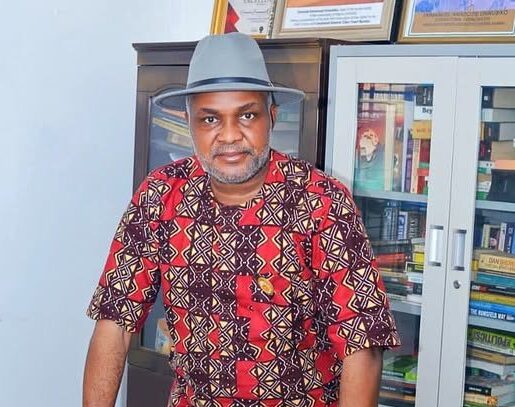
As far as politics and politicking are concerned in Nigeria, any researcher who desires a comprehensive understanding of good governance and democratic principles, should simply look up towards the British politics.
For example, a simple visit to the websites of any of the functional political parties and most especially, the Labour Party, Conservative Party, and even the newly formed Reform Party, would reveal that these parties are preoccupied with explaining their core ideologies and developmental blueprints to better the lives of the British people. They are all after putting up themselves as servants of the people and not masters and power grabbers.
Each of these and many other recognisable and operationalised political parties in Great Britain, are preoccupied with ways to convince the voters that they have what it takes to make living enjoyable and to practicalise democratic process in such a way that everyone in Great Britain is not left behind.
Besides, if you have monitored either the British Broadcasting Cooperation television or the other stylish Broadcasting platform called Sky News, in the last couple of days, you must have noticed that the key political parties in Great Britain have recently held briefing sessions during which the leaders of these parties including the Prime Minister of GB who is of the Labour Party, laboured so hard to win the hearts and minds of the British public. During these public meetings, there were no exchanges of verbal diatribes or malicious accusations being hauled at each other. What dominated their times were the essential elements of their governmental or developmental blueprints.
Whereas the governing Labour Party which is incessantly criticised especially by the Conservative Party that lost election about few months back, for failures to introduce better immigration policy to keep migrants away from invading Britain, busied themselves with telling the British public that their own version of anti-immigration policies are working and that soon the crisis of immigration would be reduced to the nearest minimum.
The Conservative Party on the other hand which is the major opposition party attacked the key economic policies of the Labour Party and were not seen attacking the person of the Prime Minister neither did we see the officials of the Labour Party antagonising or personally attacking the personalities of members of the party opposite. This is called healthy and clean politics characterised by clean and qualitative debates devoid of name-calling and character assassination.
Seeing these healthy conversations from the divergent political leanings in Great Britain, naturally brings us to the inquiry as to whether it is a doable achievement for healthy and clean politics to be practiced in my country Nigeria whereby most people think politics is a dirty game.
It is a fact that politics and politicians in Nigeria are known by the rest of the citizens as persons who lack the discipline and the grace to allow for peaceful, healthy and clean public conversations concerning the economy, security, or the well-being, welfare of the citizens. What Nigerians have seen their politicians do is to stoke up hate-filled rhetorics and to haul attacks on the personalities of the members of their opponents.
Whereas those of the political party controlling power at every level is busy abusing power and using the might of their offices to suppress dissenting voices.
On the side of the opposition politicians, their preoccupation is to plot in an unending fashion on how to topple the government using every available processes or at the next elections. There is never any kind of conversations by these politicians on their political party’s economic development initiatives or blueprints. The fact that state governments controlled by certain parties do everything against the rules of the clean political game to undermine their opponents, should tell us that our own kind of democracy and politics are anything but clean and healthy.
Besides, there is now the new kind of politics of domination that is in practice. The government at the centre controlled by the All Progressives Congress (APC) has started the campaign for the next election to re-elect the incumbent president even when the first four years which he was adjudged by the court to have won in the year 2023 controversial presidential poll, has only gone halfway, but the politicians in the party running the central government have jumped the gun and have kick-started the next campaign which is totally unlawful if we go by the extant provisions of the electoral Act. Sadly, since the federal government controls INEC and the law enforcement agencies, those who go against the law to engage in campaigns for the 2027 elections belonging to the All Progressives Congress are protected by the government.
And so, if you come to Abuja, you would think that the real campaigns for the year 2027 general election have started because in all of the streets of the metropolitan area of the Federal Capital Territory, the political campaign billboards and posters of President Tinubu adorn every available corners. Even the President believes that his government must be composed of only members of his political party as if to say that he is the president of only APC card carrying members. The APC have used federal might and the anti-graft agency of the Economic and Financial Crimes Commission to compel PDP governors to jump ship into the All Progressives Congress of President Tinubu.
The Federal minister who runs Abuja on behalf of the All Progressives Congress, who claims to be a member of the Peoples Democratic Party, has made it almost impossible for any other political party aside APC to use any of the publicly built facilities to hold their meetings even when these facilities have been commercialised. A few weeks back, the FCT ministry announced that the International Conference Centre that government blew over N300 billion dubiously to renovate, is fully booked till the year 2027.
This announcement came against the backdrops of protestations by the newly formed coalition opposition party of African Democratic Congress that they are being denied of the use of public facilities. Also, a five star hotel in Asokoro suspected to be owned by a serving minister cancelled the reservation of the African Democratic Congress only few hours to the commencement of their merger Conference.
Then from Kaduna state came the information that the police have stopped the African Democratic Congress from holding their meeting even when the All Progressives Congress that governs the state holds meetings frequently without any disruption by either thugs or the police. In Lagos State, the APC government allegedly sponsored armed thugs to disrupt the meeting of the opposition ADC just as the same thing happened in Owerri Imo state whereby APC state government allegedly sponsored armed political thugs to infiltrate the Assumpta Catholic Archdiocese Cathedral and chase away the people who gathered for the annual Odenigbo public lecture just because the former governor of Kaduna State who is now in ADC Mallam Nassir El-Rufai was the guest lecturer.
The questions to ask is why should politicians continue to muddy up the political space and causing commotion? Why is it that politicians in government offices do not tolerate their opponents to freely present their programmes? Why are the politicians making the political space violent and intolerably harsh?
The case of Nigeria is distinctive because here, the Nigeria Police Force is not a neutral institution but the hierarchy owes their allegiance to the president that appointed the Inspector-General of Police in which case the police operatives are put at the service of the central government.
The situation we have found ourselves is that whereas politicians have failed to follow the fundamental principles of good governance and democratic process which simply demands accountability on their part, and then the national policing institution that is the primary enforcer of the law, takes side with the political party controlling the government from Abuja, it therefore means that armed thugs can easily be unleashed to attack opposition politicians just so they are not organised enough to contemplate winning against the party in power.
The one danger in this sort of suffocation of the public political space is that if the opposition politicians are forced to go into hiding and to mount campaigns from their hideout, then we are not all safe going by the fact that since obtaining weapons of mass destruction is as easy as passing the junior WAEC, then these opposition politicians driven underground would be left with the only option available: pay freelance armed non-state actors to work as their political Army and since the politicians in government offices have the control of the police and armed political thugs, what then happens during elections won’t be any different from a full-fledged war.
This is where we need to call a spade by its name and to ask Nigerians to wake up and smell the coffee. Nigerians have a duty to drum it up to the government at all levels, to stop the ongoing political war of the political parties before the nation is pushed into a major war during the 2027 elections.
I say this because the people who are now in the opposition were once in government and so have the right connections to the men of the underworld whom they can always call upon to be enlisted as their foot soldiers. In these warfare and tumultuous exchanges of verbal abuses by politicians both within and outside of government, no party has the monopoly of violence because from both ends, there are persons with very deadly mindsets.
A simple experiment would reveal that there are dangerous people in all of these parties in Nigeria both inside and outside of governments: the people in government are openly telling the opposition politicians that over their (government officials) dead bodies, will the opposition coalition take over government in 2027.
Similarly, the actors in the opposition political camp are also telling those of their rivals inside government that they will do everything humanly possible to kick them out of their public offices in the year 2027. So my hypothesis is this: if these people in government are so desperate to win the 2027 poll and they wield powers and influences over the military, the highly biased Nigeria Police Force and most dangerously, they control the so-called Independent National electoral commission, it means that when two elephants fight, the grass suffers.
Therefore, how then do we expect these desperate politicians in public offices to allow for free, peaceful, transparent and fair elections in 2027? Secondly, since the politicians in the opposition coalition are mostly individuals who have been in and out of government and so have access to hire the bad boys with big guns, and they are striving to dethrone the politicians holding offices who are too desperate to allow for a fair contest, what may happen would be tantamount to a civil war unless something happens to deflate these over-bloated political ambitions from both divide.
Let me provide the context that depicts the warlike political atmospherics in today’s Nigeria.
Around January 2025, the Secretary to the Government of the Federation, Senator George Akume, said it was not yet the turn of the north to produce Nigeria’s president in 2027, warning that to do otherwise could undermine the nation’s unity and destroy her.
He, therefore, advised the Northern interest groups to wait until 2031 before running for the presidency, with a caveat that, it was not their time to throw their hat in the ring.
Akume, who spoke as a guest on a television political progamme against the backdrop of deft political scheming and coalition by different groups with the aim to take over power from the ruling APC and succeed President Bola Tinubu in 2027, declared the current president would serve two terms of eight years.
“It is not yet time for the North. This is my appeal to them. Don’t let us destroy our country because of personal ambition. It is my advice and this has been consistent. Do not let us rock the boat.
“Let us allow this power to reside in the south for eight years and then it will come to the North. To do otherwise, honestly is to destroy this country.
“This democracy and people are entitled to their views. Again, in democracy, you always have groups springing up and forming alliance, creating movement and intending to transform them into political parties.
“The political ball, quite frankly, has started to roll and there is one group that is headed by the former governor of Kano State and the Secretary is from Benue State, Emmanuel Jume. He was a member of House of Representative before.
“People have the right to form alliances but my candid advice to my people in the North is that if you should form your alliances, make sure your candidates are from the South. Why? Because that is one thing that will guarantee our territorial integrity and unity,” he said.
Reacting, former Vice President, Alhaji Abubakar Atiku, queried the grounds of equity and fairness in Akume’s admonishment.
In a statement by his Media Adviser, Mazi Paul Ibe, he pointed out that the South has had more years on the presidential seat than the North, counting from 1999.
Atiku said, “Where, then, does true equity and fairness reside? By the year 2027, the South will have enjoyed 17 years of leadership — eight years under Obasanjo, five years under Jonathan, and four years under Tinubu — while the North will have experienced only 11 years, with Yar’Adua serving three and Buhari eight. This results in a disparity of six years between the North and South, casting a shadow over the balance of power.
“In any case, the power to elect and vote out their government lies firmly with the Nigerian people, entrusted to them upon the government’s ability to prove itself worthy of the people’s ballot. But has the Tinubu government demonstrated that it deserves to be re-elected? The answer, alas, is as clear as the heavens themselves — God forbid!”
Tinubu had defeated Atiku in the 2023 presidential election, even as the latter challenged the president’s electoral victory up to the Supreme Court which eventually affirmed Tinubu’s victory.
Also, a serving senator and former governor of Sokoto State Alhaji Aminu Tambuwal gave a television interview in which he professed that he has devoted his time to ensure that Tinubu is defeated in the year 2027 election.
Dateline: February 7, 2019, Reuters reported that a key ally of the then Nigeria’s President Muhammadu Buhari said people from overseas who sought to intervene in the country’s election to be held in little over a week then would go back in body bags.
Nasir El-Rufai, then governor of the northern state of Kaduna, made the comments during a discussion programme on the Nigerian Television Authority when the topic of the international community’s role in elections was raised. It followed an international outcry over the suspension of Nigeria’s top judge.
The discussion about the role of foreign countries in elections was raised on the programme in which reference was made to concerns expressed by the European Union, the United States and Britain over the suspension of Chief Justice Walter Onnoghen over allegedly breaching asset-declaration rules.
“We are waiting for the person who will come and intervene. They will go back in body bags because nobody will come to Nigeria and tell us how to run our country,” said El-Rufai.
“We have got that independence and we are trying to run our country as decently as possible,” he said.
That same El-Rufai is now in the same camp with Atiku in the African Democratic Congress.
So there is the balance of threats and therefore the political atmospherics and climate is that of fear because politicians wanting to retain power by all means including using crooked machinations and their rivals in the opposition political camp, are well equipped with the powerful tools of violence to try to torpedo the other to win the 2027 presidential election.
This is exactly why we are calling for a clean and healthy politics to ensure that Nigeria does not burn because of the 2027 polls. Unfortunately, those who can mediate peace are warmongers. Who bails the cat? The people of Nigeria of course.
Emmanuel Nnadozie Onwubiko, is the founder of the HUMAN RIGHTS WRITERS ASSOCIATION OF NIGERIA and was NATIONAL COMMISSIONER OF THE NATIONAL HUMAN RIGHTS COMMISSION OF NIGERIA.
Opinion
RUSSIA AND ISRAEL ARE BIGGER THAN UN |By Emmanuel Nnadozie Onwubiko
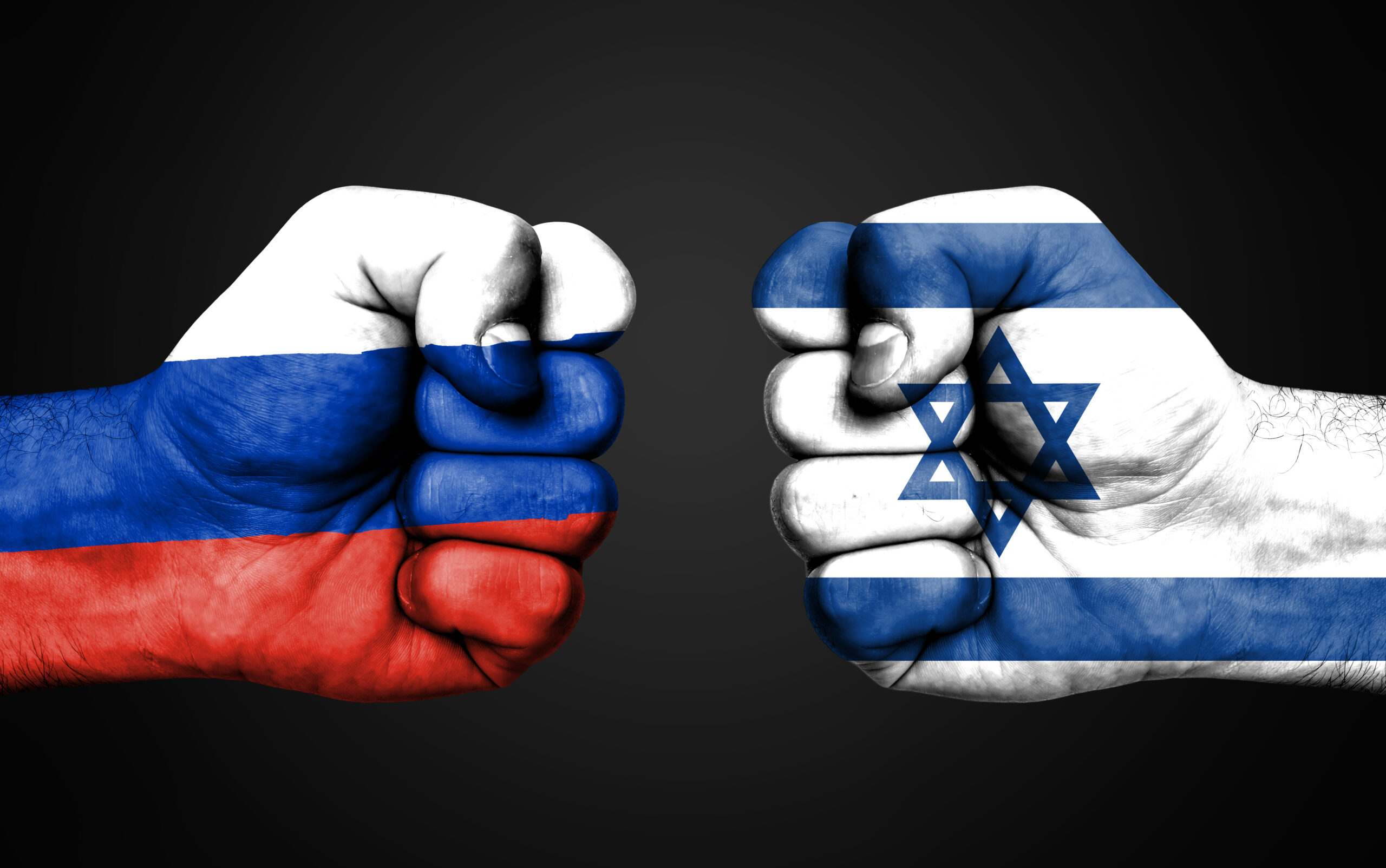
“In its majestic equality, the law forbids rich and poor alike to sleep under bridges, beg in the streets and steal loaves of bread.”
Anatole France
“The Constitution is colorblind, and neither knows nor tolerates classes among citizens.”
John Marshall Harlan
“We hold these truths to be self-evident: that all men and women are created equal”.
Elizabeth Cady Stanton
Today, the international news networks are reporting the bombing to death of 4 journalists from a hospital environment in Gaza City, which is under an intensive military blockades by Israeli military. Five journalists were earliest killed by Israel in Gaza.
The Israeli Defence Forces (IDF) have been on special assignments inside the Palestinian Homeland of Gaza- a place with a population of over 2 million Palestinians.
The military activities by the state of Israel were precipitated by the vexatious invasion of Israel by Hamas militants who killed over 200 Israeli civilians and children around October 7th, 2023.
Since after that despicable terror attack by the Palestinian Sunni Islamists known as Hamas (a US designated Foreign terrorist organisation also known as FTO), Israel began the military actions in Palestinian Homeland of Gaza, even as West Bank occupied partly by Israel has seen some flashes of military strikes.
A classified Israeli military database sighted reportedly by Aljazeera tv network, shows the vast majority of Palestinians killed in Gaza are civilians, according to a joint investigation by The Guardian, +972 Magazine, and Local Call.
Figures reviewed by the outlets revealed on Thursday indicate that, as of May 2025 – 19 months into Israel’s war on Gaza – Israeli military intelligence had listed 8,900 fighters from Hamas and Palestinian Islamic Jihad (PIJ) as confirmed or “probably” dead.
Over the same period, Gaza’s health authorities recorded at least 53,000 deaths from Israeli attacks, meaning that named fighters accounted for just 17 percent of those killed, with civilians at about about 83 percent of the total death toll.
Conflict researchers say that ratio is almost unparalleled in modern warfare. Only the Rwandan genocide, the 1995 Srebrenica massacre, and Russia’s 2022 siege of Mariupol recorded a higher civilian death rate, the authors noted. source: aljazeera
Date: 21 Aug 2025.
Conversely, Russia invaded Ukraine around February 2014 and since then, thousands of Ukrainian civilians have been killed in several bombardments. The sheer barbarism of what Russia is doing inside of Ukraine is unprecedented.
So, looking at how Russia and Israel are attacking the weaker countries of Ukraine and Gaza of Palestinians, and then the United Nations would hold meetings including security council meetings and issue declarations and Resolutions that are non-binding, and also since Russia as a veto power holding member of the UN Security Council, then Israel backed by USA another Veto power wielding member of the unequal Security Council of the UN, neither Russia nor Israel may ever have to worry about any threats of military actions by the UN against each of their territories for violating the international law.
Besides, the application of international law is unequal and opaque, just as the relevant international treaties did not make it explicit that stronger Nuclear powerful nations are prohibited from attacking weaker nations or seek to annex those territories, just as Russia and Israel are currently doing in Ukraine and Palestinian Homeland.
A reliable source: theforge.defence.gov.au
30/08/2023, inform us much profoundly on why I said the two Nuclear powers of Russia and Israel are way bigger than the United Nations, made up of over 100 other nations.
The source said the Kellogg-Briand Pact was the first attempt to outlaw war (although the League of Nations required states to submit disputes to arbitration, it did not attempt to outlaw war as such). The parties to the 1928 General Treaty for Renunciation of War as an Instrument of National Policy ‘condemn[ed] recourse to war’ and agreed to ‘renounce it, as an instrument of national policy in their relations with one another’. The goal during that period was to reverse the legal presumption in favour of belligerence.
In the aftermath of the Second World War (1945), the United Nations Charter came into being, spurred by that war’s many atrocities and the epic number of civilian and military deaths. The principles from the Kellogg-Briand Pact were incorporated into the more robust UN system. The rules regarding the use of force by states contained in the Charter may be challenged from time to time, but are clear: ‘[N]o one really contests that the use of force is strictly forbidden in contemporary international law.
This prohibition is recognized as a core rule of the law of nations.’ There are, of course, some ambiguities at the margins and this keeps legal scholars and foreign ministry legal advisors occupied. As a general matter, the International Court of Justice has rejected any ‘innovative’ interpretations of the law. Cyber is an evolving area, but that is more a question of determining how the law applies to novel situations, and not real confusion as to the content of the law itself.
Contemporary international law prohibits resort to force to threaten or attack other countries (UN Charter, Article 2, para. 4: ‘All Members shall refrain in their international relations from the threat or use of force against the territorial integrity or political independence of any state, or in any other manner inconsistent with the Purposes of the United Nations.’).
The prohibition on the use of force is itself a reflection of the primacy of the two primary incidents of statehood: state sovereignty and the territorial integrity. So long as a national government has effective control over its land and sea territory, it has the legal protection of the Charter against other states trying to dislodge it by force. This goes into the related question of international recognition of states and governments and the definition of a state’s maritime borders, perhaps topics for another time.
The prohibition on the use of force includes a prohibition on one state assisting another state in a breach of the prohibition on the use of force, to include a prohibition on letting the aggressor use the assisting state’s territory to attack a third country (looking at you, Belarus).
Well, Russia and Israel do not believe that they are subjected to the dictates of the aforementioned aspects of international treaties.
The following are just very few records of casualties of Ukrainian and Palestinian civilians killed in the two unjust wars waged by Russian soldiers and Israel Defense Forces.
October 13, 2023
SOURCE: Reuters
(Reuters) – A Reuters video journalist was killed and six other journalists injured in southern Lebanon on Friday when missiles fired from the direction of Israel struck them, according to a Reuters videographer who was at the scene.
The group of journalists, including from Al Jazeera and Agence France-Presse, were working near Alma al-Shaab, close to the Israel border, where the Israeli military and Lebanese militia Hezbollah have been trading fire in border clashes.
Lebanese Prime Minister Najib Mikati and a Hezbollah lawmaker blamed the incident on Israel.
Reuters said in a statement that Issam Abdallah had been killed while providing a live video signal for broadcasters. The camera was pointed at a hillside when a loud explosion shook the camera, filling the air with smoke, and screams were heard.
January 7, 2024.
SOURCE: aljazeera
The Israeli military has seemingly walked back its justification for targeting a vehicle in Gaza last week, killing two Al Jazeera journalists, United States broadcaster NBC reported.
Hamza Dahdouh, the eldest son of Al Jazeera’s Gaza bureau chief Wael Dahdouh, was killed in an Israeli missile strike on Sunday in Khan Younis, southern Gaza. Journalist Mustafa Thuraya was also killed in the attack, while a third passenger, journalist Hazem Rajab, was seriously injured.
At the time of the attack, the Israeli army said it was targeting a “terrorist” in the vehicle.
May 17, 2025
SOURCE: palestinechronicle
Five Palestinian journalists were killed on Sunday in separate Israeli airstrikes across the Gaza Strip, raising the number of journalists killed since October 7 to more than 222, according to local sources.
Al Jazeera reported that Israeli warplanes targeted and killed journalists Aziz al-Hajjar, Abdel Rahman al-Abdallah, Nour Qandil, and her husband, Khaled Abu Seif. Their family members were also killed in the strikes.
Photojournalist Aziz al-Hajjar was killed along with his wife and children when an Israeli airstrike hit their home in the Saftawi neighborhood in northern Gaza.
20 MAY 2025
SOURCE: theguardian
At least 91 Palestinians have been killed and many more injured in a third day of Israeli strikes across Gaza, according to medical officials in the strip, who said a high proportion of the dead were women and children.
The timing of the strikes in the new Israeli offensive appears to have increased the proportion of women and children among the victims, with many sleeping when the missiles struck overnight or very early in the morning. Among those pulled alive from rubble on Thursday was a month-old baby girl, but her parents and brother were killed.
A first wave of airstrikes on Tuesday shattered a two-month pause in hostilities and killed more than 400, according to the health ministry in Gaza, in what may have been the single bloodiest day of the 18-month conflict. The dead included 183 children and 94 women, Palestinian officials said.
4TH APRIL, 2025
SOURCE: hrw.org
(Jerusalem, April 4, 2024) – An Israeli airstrike on a six-story apartment building sheltering hundreds of people in central Gaza on October 31, 2023, is an apparent war crime, Human Rights Watch said today. The attack, which killed at least 106 civilians, including 54 children, is among the deadliest single incidents for civilians since the Israeli government’s bombardment and ground incursion into Gaza following the Hamas-led attacks on Israel on October 7.
Human Rights Watch found no evidence of a military target in the vicinity of the building at the time of the Israeli attack, making the strike unlawfully indiscriminate under the laws of war. Israeli authorities have provided no justification for the attack. The Israeli military’s long track record of failing to credibly investigate alleged war crimes underscores the importance of the International Criminal Court (ICC)’s inquiry into serious crimes committed by all parties to the conflict.
“Israel’s unlawful airstrike on an apartment building on October 31 killed at least 106 people, including children playing football, residents charging phones in the ground-floor grocery store, and displaced families seeking safety,” said Gerry Simpson, associate crisis and conflict director at Human Rights Watch. “This strike inflicted massive civilian casualties without an apparent military target – one of scores of attacks causing overwhelming carnage, and highlighting the urgency of the ICC probe.”
RUSSIAN KILLING
SOURCE: WIKEPEDIA
According to local authorities, 458 bodies have been recovered from the town, including nine children under the age of 18.
Among the victims, 419 people were killed with weapons and 39 appeared to have died of natural causes, possibly related to the occupation. A memorial wall was installed in Bucha with 501 names of killed residents.
The UN High Commissioner for Human Rights documented the unlawful killings, including summary executions, of at least 73 civilians in Bucha. Photos showed corpses of civilians, lined up with their hands bound behind their backs, shot at close range. An inquiry by Radio Free Europe reported the use of a basement beneath a campground as a torture chamber. Many bodies were found mutilated and burnt, and girls as young as fourteen reported being raped by Russian soldiers.
SOURCE: REUTERS
DATE: FEB 8, 2024
GENEVA, Feb 8 (Reuters) – At least 8,000 people were killed by fighting or war-related causes in Russia’s months-long conquest of Mariupol, one of the biggest battles of the nearly two-year war between Russia and Ukraine, according to Human Rights Watch.
Mariupol became a byword for horror during a nearly three-month-long Russian siege for control of the strategic port city between March and May 2022, with trapped civilians forced to bury their dead by the roadside.
The Human Rights Watch assessment, based on satellite and other images of grave sites, is one of the only independent estimates of the death toll so far.
Ukraine has said tens of thousands were killed but that it cannot give an exact number without access to the city, now under Russian control.
SOURCE: hrw.org
DATE: JULY 8, 2024
(Kyiv) – Russian forces’ strikes on multiple cities in Ukraine on July 8, 2024, killed at least 42 civilians, including five children, and injured at least 190, according to Ukrainian authorities. The attacks also caused significant damage to vital infrastructure, including the Okhmatdyt children’s hospital in Kyiv, the country’s largest children’s hospital.
The hospital’s director told the UN Security Council that the strike severely damaged several departments, including the intensive care units and oncology and surgical wings, and completely destroyed the toxicology and traumatology departments. The director also said that hundreds of children, including those undergoing dialysis treatment, were evacuated immediately after air raid sirens went off at 9:52 am.
When the first strike hit, less than an hour after the sirens went off, patients and staff were still in the hospital, including three patients undergoing heart surgery. Ten children were injured in the attack. On July 10, the Ukrainian health minister reported that a child who had been evacuated from Okhmatdyt’s intensive care unit in a critical condition had died in another hospital.
So, what then is the essence of the members if humanity congregating under the auspices of the UN when just 5 members wielding Veto powers can constantly stop the UN from taking military steps to protect the weak and vulnerable members that have no Nuclear weapons? Your guess is as good as mine that the UN is a dysfunctional contraption set up to protect the Powerful nations.
EMMANUEL NNADOZIE ONWUBIKO IS the founder of HUMAN RIGHTS WRITERS ASSOCIATION OF NIGERIA and was NATIONAL COMMISSIONER OF THE NATIONAL HUMAN RIGHTS COMMISSION OF NIGERIA.
-

 News10 months ago
News10 months agoNUJ FCT Council Mourns The Loss of Senior Journalist, Isaiah Abraham
-
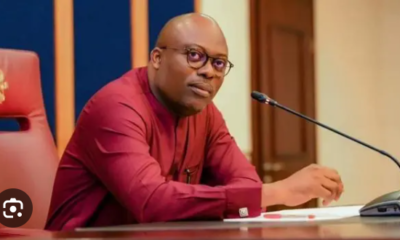
 News10 months ago
News10 months agoHURIWA Declares Governor Fubara’s Emergence as Divine, Urges Support for Rivers State’s Progress
-
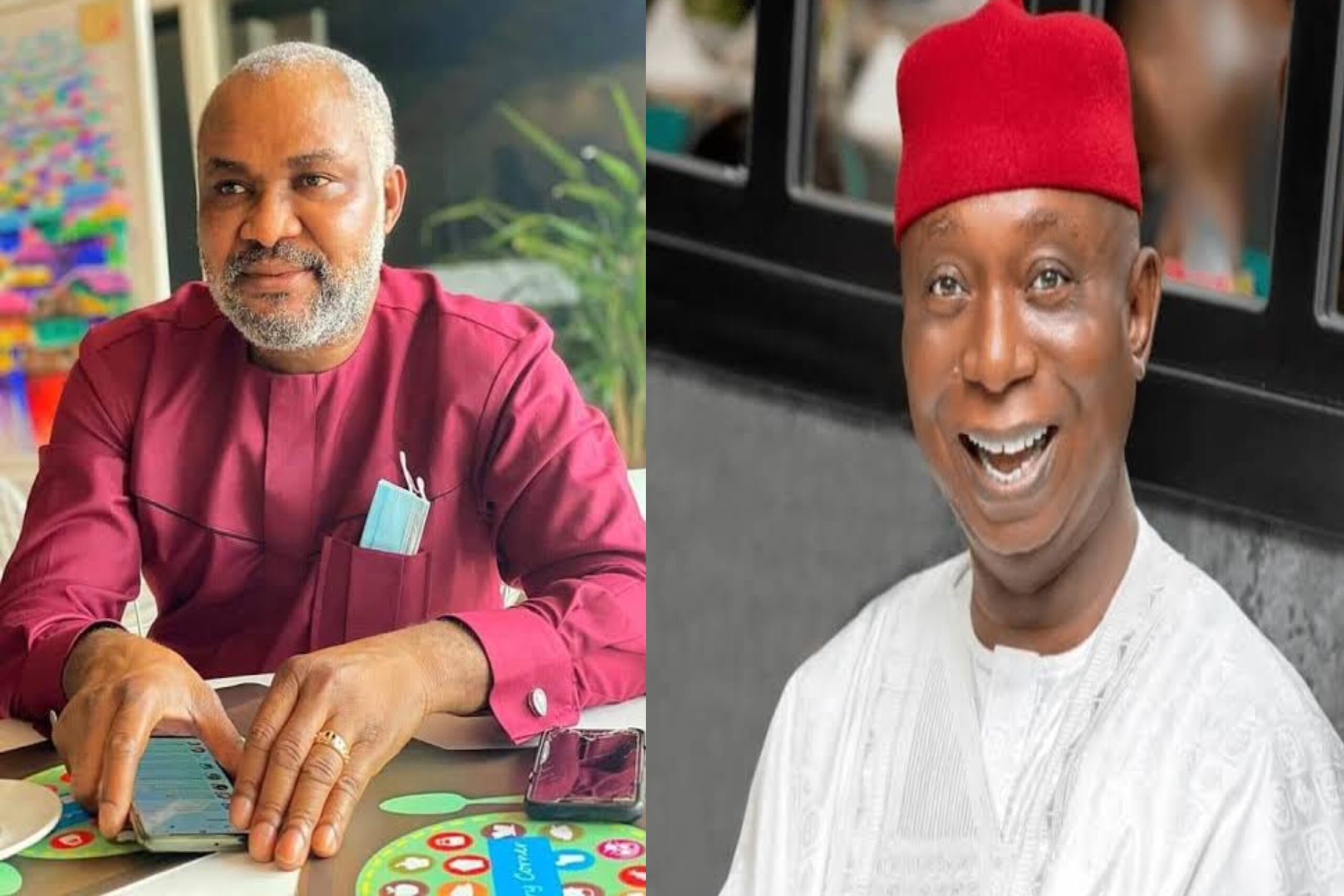
 News10 months ago
News10 months agoAnioma State as panacea to South-East marginalization – By Emmanuel Onwubiko
-

 Opinion8 months ago
Opinion8 months agoNIGERIAN WOMAN IN DIASPORA, CULTURAL SHOCKS – By Stacey Ukaobasi Onwuegbuchulam
-
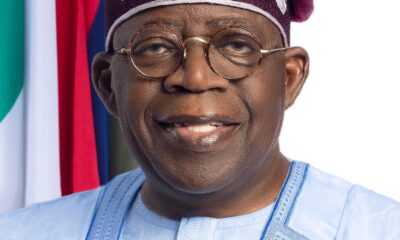
 News11 months ago
News11 months agoHURIWA Blames Serial Stampedes on Weaponized Poverty, Warns of Nigeria’s Rapid Decline
-
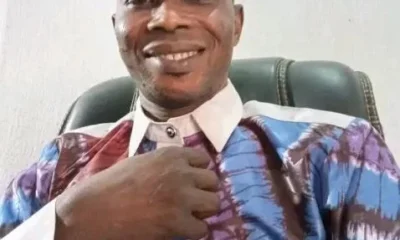
 News10 months ago
News10 months agoJealous Husband Stabs Nigerian Bishop To Death Over Suspicion Of Sleeping With Estranged Wife
-
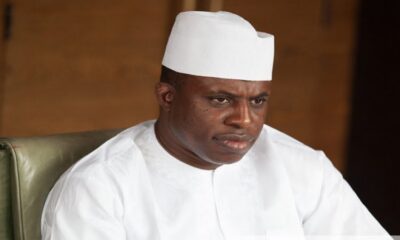
 News10 months ago
News10 months agoTinubu sympathizes with ex-speaker Bankole on the death of his mother
-
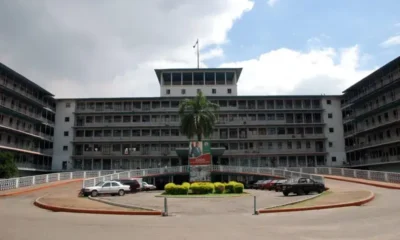
 Health8 months ago
Health8 months agoA complete list of 154 healthcare facilities across Nigeria that provide free emergency obstetric care and VVF (Vesico-Vaginal Fistula) surgeries.


